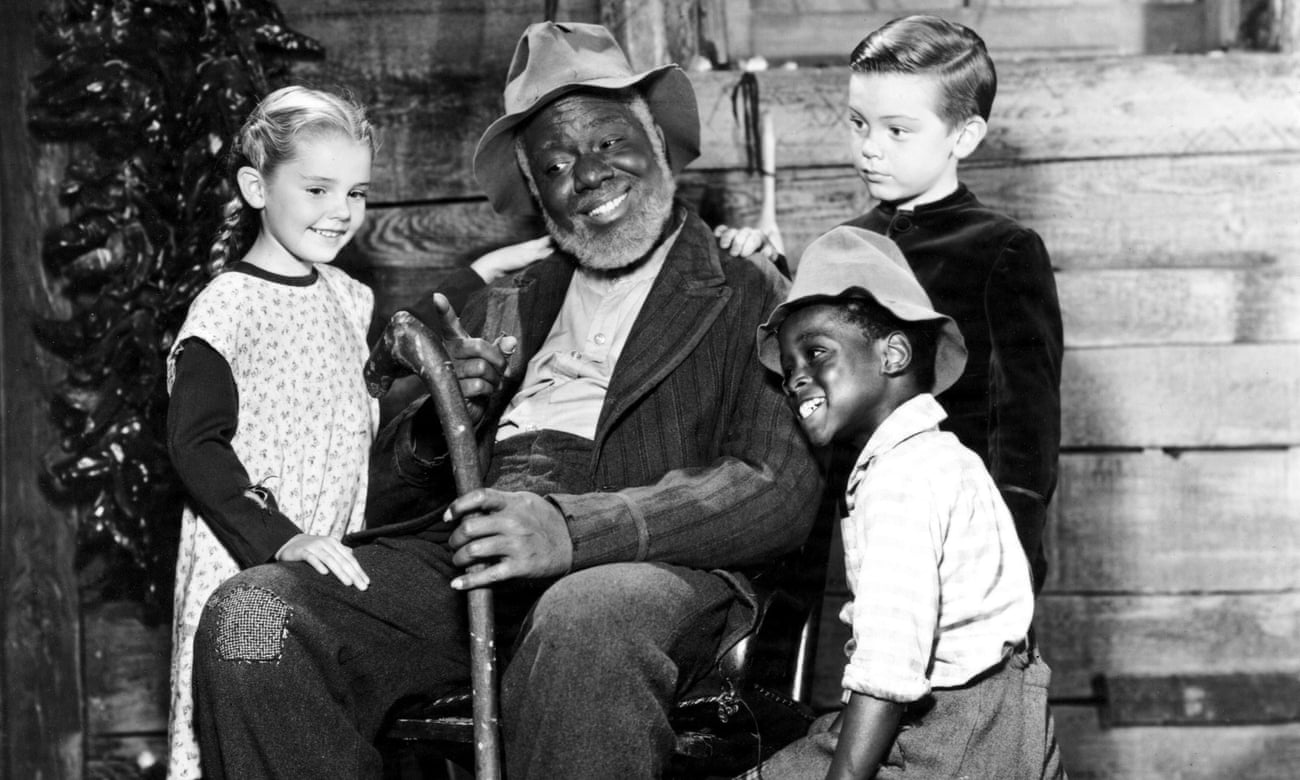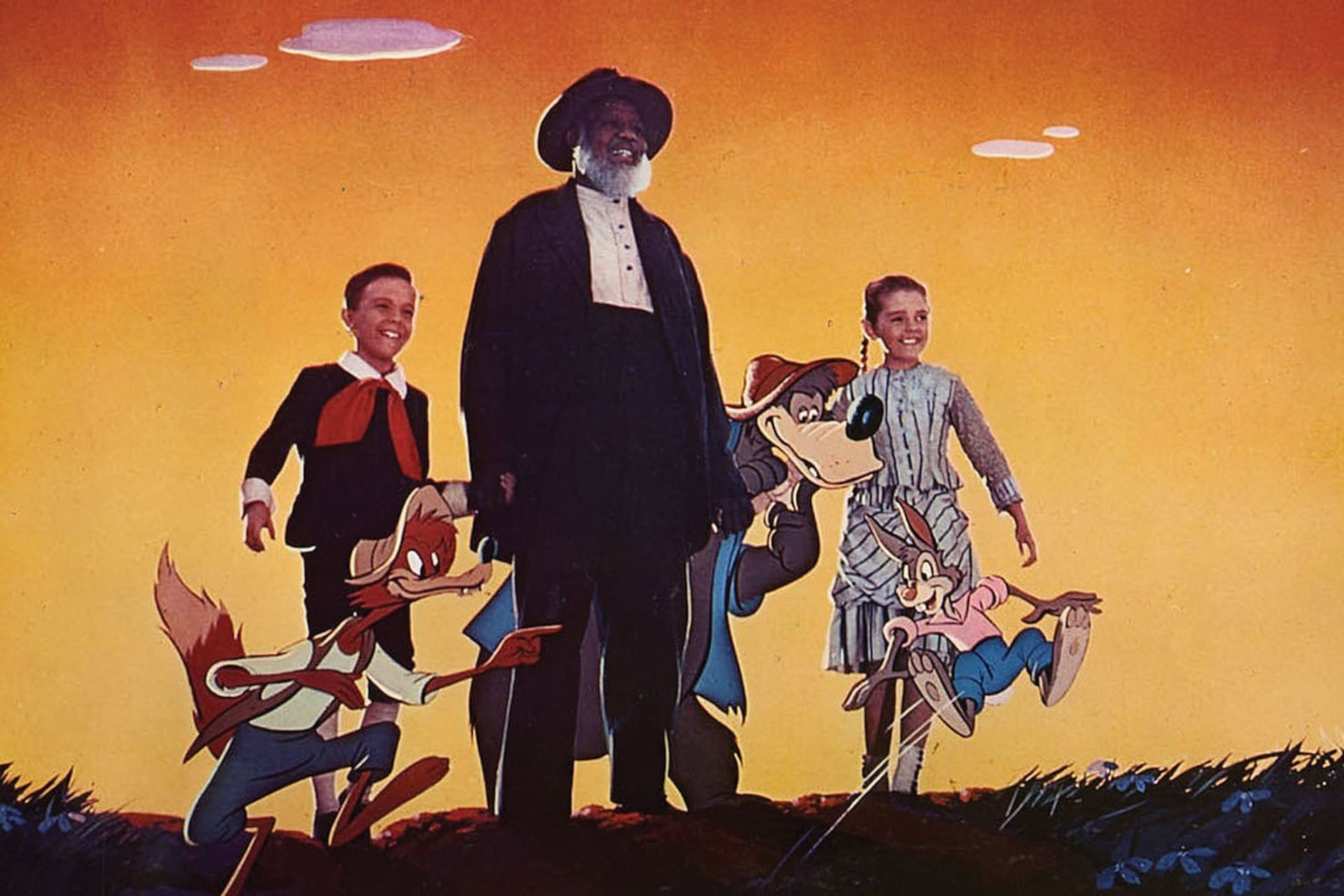 |
Song of the South, Disney’s 1946 live-action/animation hybrid, won’t be appearing on the company’s new streaming app. Photograph: Photo 12/Alamy Stock Photo |
For all the uncertainty surrounding the streaming wars – even for a dominant company like Netflix, which is still hemorrhaging billions of dollars – there’s a reason to believe that Disney+ is a safe bet. Even if every one of its original launch titles landed with a thud, Disney just needed to crack open the vault and allow viewers to dive, Scrooge McDuck-like, into its riches: 80 years of peerless animation, from early classics like Snow White and the Seven Dwarfs and Bambi to renaissance titles like The Little Mermaid and Beauty and the Beast to recent hits like Frozen and Moana. And that’s to say nothing of Pixar, Marvel, Star Wars and a mule who kicks 100-yard field goals.
Yet The Walt Disney Company has a longstanding Walt Disney problem, and for Disney+, the answer so far has been to mix propaganda with gentle disclaimers. While the new documentary series The Imagineering Story plays up Disney’s innovation and meticulousness in developing the company’s theme parks, the retrograde elements in some of his animated films (the singing crows in Dumbo, the “stay with your own kind” sentiment of The Jungle Book, the Siamese cats in Lady and the Tramp, the “What Made the Red Man Red?” song in Peter Pan, etc) are preserved with a warning to viewers that the films “may contain outdated cultural depictions”. The word “may”, frankly, smacks of unnecessary bet-hedging.
But there’s one title that won’t be appearing on the service any time soon: 1946’s Song of the South, a live-action/animation hybrid that’s much more comprehensive in its “outdated cultural depictions” than any other film in the catalog. It’s creepily apropos that Song of the South debuted in the racially segregated city of Atlanta, an urban center that the Georgia plantation dwellers in the film consider grimly as a chaotic destination for its African American characters. The film was a modest success when it came out – and won an Oscar for the original song Zip-a-Dee-Doo-Dah – and children of multiple generations got to know it through periodic rereleases that lasted as far as 1986. But it was never released on home video in the US, and its most enduring cultural footprints are the song and the Splash Mountain log flume rides at Disneyland, Magic Kingdom and Tokyo Disneyland.
 |
| Uncle Remus, played by James Baskett, is at the center of Disney’s Song of the South. Photograph: Walt Disney |
The issue of how to contend with Song of the South is as thorny as the briar patch the film’s mischievous animated hero, Br’er Rabbit, calls home. It does no one any service to paper over an important piece of Disney history, even one that so severely maligns the image of Walt Disney as the benevolent dream-maker responsible for your last family vacation and myriad plushies and lunchboxes. Yet to dump it on Disney+ with a standard disclaimer would expose casual clickers to some truly shocking material without the context necessary to process it. The new six-part history of the film on Karina Longworth’s You Must Remember This podcast, cheekily timed against Disney+’s debut, is a good place to start reckoning with it. The film itself is hard to stomach on its own.
On a technical level, Song of the South extends the experimentation Disney did with live-action and animation two years before in The Three Caballeros, a tour of Latin America which itself isn’t free of stereotypes, but does feature the unimpeachable delight of Aurora Miranda singing and dancing the samba with Donald Duck. But with some notable exceptions, like the Zip-a-Dee-Doo-Dah sequences that bookend the film, the live-action and animation sections are cordoned off from each other – to such an extent, in fact, that the three main Br’er Rabbit stories were harvested as standalone cartoons for television. Yet the worlds and themes of both reinforce a nostalgia for a plantation in the Reconstruction era, with its idyllic beauty and “bodacious” critters, its simple life lessons, and its harmonious racial hierarchies.
The word “slavery” never gets uttered, but surely Uncle Remus (James Baskett), the avuncular black man at the film’s center, was once the property of the plantation he calls home. The creation of folklorist Joel Chandler Harris, Uncle Remus is known for his Br’er Rabbit stories, and he becomes a father figure and friend to seven-year-old Johnny (Bobby Driscoll), a white boy who’s visiting his grandmother’s plantation as his parents grapple with some untold problem in their marriage. Remus’s sensitivity to Johnny far exceeds his parents’ coldness and neglect, but that warmth comes with the implication that men like Remus – and the housekeeper Aunt Tempy, played by Hattie McDaniel – are human only insofar as they serve the needs and destinies of the white characters. That notion persists in films deep into the 21st century, too.
There are plenty of examples of pernicious racism in Song of the South that are right there on the surface: the minstrelsy of the animated characters, particularly Br’er Fox; the slang in the dialogue; a wandering chorus singing traditional black songs; and, most notoriously of all, a fable where Br’er Fox and Br’er Bear use a tar baby to fool and ensnare Br’er Rabbit. (That part didn’t make Splash Mountain.) Yet the subtle low point of the film comes in Remus’s narration just before Zip-a-Dee-Doo-Dah, when he reminiscences about how things were “a long time ago,,” when “every day was mighty satisfactual”. “If you’ll excuse me for saying so,” he adds, “’twas better all around.”
Disney song compilations have the luxury of extracting Zip-a-Dee-Doo-Dah from that introduction, leaving a cheery little number about carefree days of sunshine and bluebirds and the other pleasures of communing with nature. Yet the rotten heart of Song of the South is the implication that such carefree days were easier to come by in the idealized world of the pre-civil war south. Things are better for everyone, the film suggests, when men like Uncle Remus accept their subservience and benefit from the largesse of white plantation owners, even when they’re ostensibly free to leave at any time.
An important point to make about Song of the South – and a lot of controversial art, for that matter – is that it’s not an act of PC revisionism to call out its prejudices, because plenty of people were doing so at the time, too. Disney produced the film over the objections of the NAACP and the American Council on Race Relations, and rejected efforts to soften the script by the southern-born writer Dalton Reymond. And it was released to picket lines in some cities and some scathing criticism from reviewers, politicians and other black advocacy groups.
Keeping Song of the South away from children in 2019 is a sensible and responsible decision – I shooed my own kids away while watching it – but it’s important to remember that its legacy still colors the Walt Disney Company, no matter how hard the studio works to burnish Walt’s reputation. And even if it never sees the light of day officially, its attitudes are present in white nostalgia for “the singing heart of the old south” and black characters who either benefit from white beneficence or nobly assist them at the cost of their own agency. Those stories are readily available on every streaming service on the market.
By Scott Tobias -theguardian.com

Comments
Post a Comment